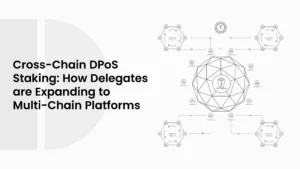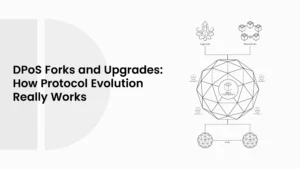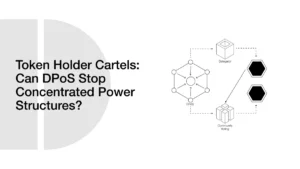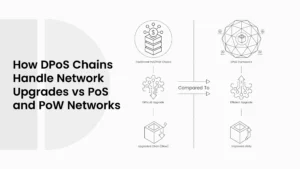DPoS and Rent-Seeking Behavior: How Validators Can Extract Value Without Adding Utility
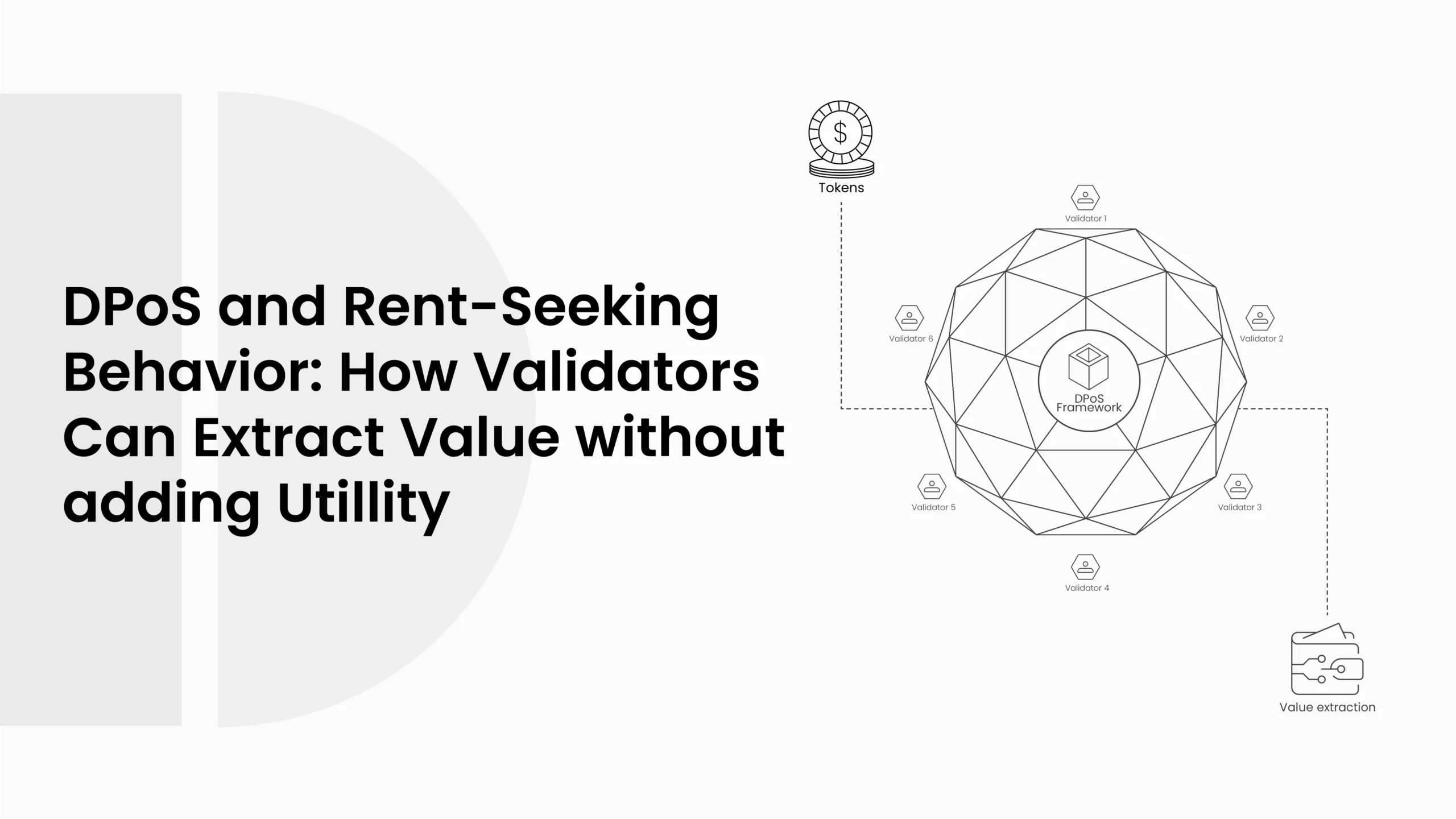
Delegated Proof of Stake, also called DPoS, is one of the most talked-about systems in blockchain today. It was made to be fast and community driven. Instead of large mining farms consuming huge amounts of energy, DPoS allows token holders to vote for special members known as validators. These validators are the ones that confirm transactions and add blocks to the chain. In return, they get paid.
- What is Delegated Proof of Stake (DPoS)?
- What Does Rent-Seeking Mean in Economics?
- How Validators Earn in DPoS
- Rent-Seeking Behavior in DPoS Systems
- Concentration of Voting Power
- Cartels and Collusion
- Passive Validators
- Why Rent-Seeking Hurts Blockchain Growth
- Lost Innovation
- Reduced Trust in Governance
- Slower Adoption
- Public Choice Theory and DPoS Governance
- Lessons from Economics
- Why Governance Design Matters
- Real Examples from Blockchain Networks
- EOS and Vote Buying
- TRON and Validator Cartels
- Other Networks with Better Models
- How to Reduce Rent-Seeking in DPoS
- Transparency and Monitoring
- Penalties and Slashing
- Rotation and Randomness
- Incentivizing Innovation
- Future of DPoS and Fair Governance
- Conclusion
- Frequently Asked Questions About DPoS and Rent-Seeking Behavior
- What is DPoS in simple words?
- What does rent-seeking mean in blockchain?
- Why is rent-seeking harmful for DPoS?
- Can rent-seeking be stopped in DPoS?
- Are all validator rewards rent-seeking?
- Glossary of Key Terms
The idea sounds fair. Users vote for honest validators, validators keep the chain safe, and everyone benefits. But in practice, it is not always like this. Some validators end up making money without really doing much. They are there only to collect the rewards, while not adding any new value to the network. This is what economics calls rent-seeking.
Rent-seeking is when someone earns income without creating fresh value. In blockchain, this can happen when validators form groups, buy votes, or just sit and take fees while not improving the network. Over time, this can hurt innovation, slow growth, and reduce trust in the system.
ALSO READ: Is DPoS Ready for AI-Generated Smart Contracts and Autonomous DAOs?
What is Delegated Proof of Stake (DPoS)?
DPoS is a type of consensus mechanism. That means it is the method the blockchain uses to decide who gets to add the next block. In Proof of Work, computers solve puzzles and consume a lot of power. In Proof of Stake, people lock up tokens and are chosen randomly. In DPoS, it works a little differently.
Here, people who hold tokens do not validate blocks directly. Instead, they vote for a smaller group of validators, sometimes called delegates. These validators are like representatives. They are trusted by the community to make blocks on everyone’s behalf.
The number of validators is usually small, maybe 21 or 27, depending on the blockchain. Because there are fewer validators, decisions are faster, and transactions are confirmed in seconds. This is why many chains using DPoS can handle high speed and low fees compared to Proof of Work.
Another reason DPoS became popular is governance. Token holders get a voice by voting. The theory is that if validators behave badly, people can just vote them out. It sounds democratic. But in practice, sometimes the biggest token holders keep voting for the same group, and this creates problems.
Some famous blockchains that use DPoS are EOS, TRON, and Steem. They all promise speed, low cost, and community governance. Still, they also show examples where DPoS faces challenges, like centralization of power or vote trading.
What Does Rent-Seeking Mean in Economics?
Rent-seeking is a word from economics. It means that when someone makes money but does not create anything new or useful for society. They only take the value that is already there. The idea was studied for many years in public choice theory, where researchers looked at how groups and individuals sometimes use power for private gain instead of public good (Dincă et al., 2021).
A very common real-world example is lobbying. Companies spend money to convince governments to make rules that help them. The company might earn bigger profits because of those rules, but nothing new was created. Another example is when a monopoly charges higher prices because no one else can compete. The company gains, but the customers lose, and society does not get more value.
The same thinking can be used in blockchain. If a validator is earning tokens only because they sit in a top spot, but they are not doing anything extra for the community, then they are basically rent-seeking. They take rewards without real innovation or added utility.
Rent-seeking is harmful because it reduces growth. Instead of people using resources to invent, build, or improve, they spend them on protecting their own position. This slows down progress. It can also lower trust, since others feel the system is unfair. Over time, this weakens the whole economy, or in our case, the blockchain network (Lambsdorff, 2002).
Here is a simple way to look at the difference between productive activity and rent-seeking:
| Activity Type | What Happens | Result for Society | Example |
| Productive Activity | Creates new goods or services | Increases total wealth and innovation | Building a new app, farming, providing cloud services |
| Rent-Seeking | Takes value without new creation | Shifts wealth but does not grow it | Lobbying for monopoly, collecting rewards without work |
| Mixed Activity | Some creation but also protection of position | Partial growth, partial waste | Company patents tech but also blocks competition |
This makes it clear why rent-seeking is a problem in blockchain, too. Validators should be like the productive side, helping the network grow and stay secure. But when they act only for rewards, they are closer to the rent-seeking side.
How Validators Earn in DPoS
In Delegated Proof of Stake systems, validators are rewarded for the job they do. Every time a block is produced on the blockchain, there are rewards. These rewards can come in two main forms: block rewards and transaction fees. Validators share these rewards. Sometimes they also give part of the rewards back to the token holders who voted for them, almost like dividends.
In theory, this is a fair system. Validators are supposed to secure the network, confirm transactions, and keep everything running smoothly. They are like the backbone of the chain. Without them, the system would not work. That is why they get paid.
But the problem starts when validators keep earning rewards even if they are not adding any extra value. For example, a validator might just sit and collect fees, but never work to improve governance, never contribute to new projects, or never support upgrades. They become passive. This is where rent-seeking shows up inside DPoS.
Another issue is when big validators join together in secret groups, sometimes called cartels. They protect each other’s positions and share power. This way, even if the community wants change, it is very hard to vote them out. These validators keep taking rewards but block the system from becoming more innovative or fair.
ALSO READ: How Generative AI Could Simplify DPoS Codebase Maintenance
To see the difference, look at this table.
| Type of Validator Work | Example Behavior | Impact on Blockchain | Utility Added |
| Useful Work | Running reliable servers, keeping uptime high, updating code, helping test network upgrades | Makes the chain faster and more secure | High |
| Community Contribution | Sharing reports, educating token holders, building tools for users | Builds trust and adoption | Medium to High |
| Rent-Seeking Work | Just producing blocks without improving anything, relying on whale votes, or forming cartels | Rewards go to few insiders, trust goes down | Low or None |
When validators are active and helpful, the blockchain grows. But when too many of them only focus on rewards, the system begins to look like old rent-seeking in economics. It is money taken without new value being added.
Rent-Seeking Behavior in DPoS Systems
Rent-seeking in Delegated Proof of Stake does not look much different from politics or economics. Validators can use their position to collect rewards without really improving the chain. This section looks at the main ways it happens.
Concentration of Voting Power
One big issue is when the same big token holders, sometimes called whales, control most of the votes. They keep voting for the same validators again and again. This creates a closed circle. Smaller token holders, even if they want change, cannot do much because their votes are weaker. The result is that validators stay in power even if they are not performing well.
This means that rewards keep flowing to the same few addresses. It also makes the system look unfair, since it is no longer a level playing field. Instead of community democracy, it becomes elite control.
Cartels and Collusion
Another problem is validator cartels. A cartel is when validators make deals with each other. They agree to support one another and sometimes even share the profits. It is similar to old companies making price-fixing deals in traditional markets.
In DPoS, cartels mean that even if one validator is lazy or corrupt, the others keep them in power. They trade votes, they lobby whales, and they close the system to new competition. This blocks innovation. It also makes it harder for new validators with fresh ideas to join the set.
Passive Validators
Passive validators are another rent-seeking form. They do not break rules, but they also do not help much. They run the minimum required servers, collect rewards, but stay silent on everything else. They do not propose improvements, they do not educate the community, and they do not push for new use cases.
Over time, too many passive validators make the system weak. The blockchain is technically running, but it is not moving forward. It becomes stale. Users see this and lose interest, which lowers adoption and market value.
Why Rent-Seeking Hurts Blockchain Growth
Rent-seeking is not just a small issue in DPoS; it can hurt the whole blockchain over time. When validators focus only on collecting rewards instead of adding real value, the network loses its energy. Users begin to feel that the system is unfair, and developers may move away to other blockchains that look more open.
Lost Innovation
Innovation is the heart of blockchain. Every upgrade, new tool, or better governance rule helps the system grow. But if validators spend their resources only on keeping their own position, they are not putting time or money into new things. That slows down innovation. The chain becomes less attractive for developers, and the wider crypto world may start to ignore it.
Reduced Trust in Governance
DPoS was supposed to be democratic. Token holders vote, validators act, and the network stays balanced. But if whales control the voting and cartels protect their friends, people lose trust. The small token holders stop voting because they feel it will not change anything. Trust is lost, and that is dangerous for a system that relies on community power.
Slower Adoption
Rent-seeking also makes adoption harder. Businesses and users want to join blockchains that are active and fair. If they see the same insiders keeping all rewards and blocking others, they will not choose that chain. Adoption slows, and with it the value of the whole ecosystem.
| Area of Impact | What Happens Under Rent-Seeking | Long-Term Result |
| Innovation | Validators stop building new tools, focus on rewards | Slow progress, outdated tech |
| Governance | Whales dominate voting, cartels protect each other | Loss of trust, weaker community |
| Adoption | Users and developers look for better options | Decline in growth and activity |
| Market Value | Fewer users and weaker trust lower demand | Token price may fall |
This shows that rent-seeking is not just unfair for token holders; it can directly harm the health of the blockchain. A network that looks rich in the short term may struggle in the long term if rent-seeking keeps spreading.
Public Choice Theory and DPoS Governance
Public choice theory is a branch of economics that studies how people in power often act for themselves instead of the public good. It says politicians, bureaucrats, or groups sometimes make rules only to protect their own position. They do not always act to help society. Instead, they seek private gains, like money, influence, or votes (Dincă et al., 2021).
This is very close to what is seen in DPoS. Validators, in theory, should work for the network. They get rewards because they keep the system running smoothly. But when rent-seeking happens, validators act more like politicians in a captured system. They focus on staying in power, building alliances, and keeping their rewards.
ALSO READ: How Green Bonds Could Be Managed Using DPoS Chains
Lessons from Economics
From public choice studies, people learn that rent-seeking wastes resources. Instead of creating new wealth, groups spend time fighting over existing wealth. In blockchain, this looks like validators spending energy on vote buying or collusion rather than on security or innovation. As Lambsdorff (2002) showed in his work, higher rent-seeking usually leads to lower overall growth.
Why Governance Design Matters
The way DPoS governance is designed decides if rent-seeking becomes strong or weak. If voting is transparent, if token holders can easily see what validators are doing, then abuse is harder. But if the system has no checks, validators can dominate like interest groups in politics.
The key point from public choice theory is that systems must include rules that stop private actors from using public roles for selfish ends. For blockchain, this means having penalties, rotation of validators, or clear reporting rules. Without these, rent-seeking becomes normal.
Real Examples from Blockchain Networks
The rent-seeking problem is not just a theory. It has already been seen in real blockchain networks that use Delegated Proof of Stake. Some of the biggest examples are EOS and TRON. Both projects promised high speed and community governance, but over time, questions were raised about validator behavior.
EOS and Vote Buying
EOS was one of the first big blockchains to use DPoS. It started with huge excitement, fast transactions, and large funding. But soon after launch, reports came out that some validators were buying votes. Instead of token holders freely picking the best candidates, validators offered rewards or deals in exchange for votes.
This created a cycle where a few large validators stayed in power, even if they were not adding much utility. Critics said the system became captured by insiders. The promise of fair community governance turned into a small group controlling rewards.
TRON and Validator Cartels
TRON also faced similar controversies. With only a limited number of validators, sometimes called Super Representatives, power became concentrated. Observers noticed that the same group kept winning, often backed by whale accounts. There were claims of cartels, where validators supported each other and blocked new participants.
Like EOS, this reduced trust. Many token holders felt their votes did not matter. Even if they wanted to replace a validator, the system was too tilted toward those already in power.
Other Networks with Better Models
Not every DPoS chain had the same problems. Some smaller networks tried to reduce rent-seeking by adding penalties for inactivity or by rotating validators more often. Others pushed for more transparency, like publishing detailed validator reports. These models show that rent-seeking can be controlled, but it requires strong governance design.
How to Reduce Rent-Seeking in DPoS
Even though rent-seeking is a serious problem, it is not impossible to control. Blockchain systems can add rules and incentives that make it harder for validators to only collect rewards without real work. The goal is to push validators toward useful behavior while punishing free-riding.
Transparency and Monitoring
One step is to make the validator activity more open. If every validator has to publish reports of uptime, performance, and contributions, token holders can see who is doing the job. Public dashboards can show which validators are active and which are not. This transparency makes it harder for rent-seekers to hide.
Penalties and Slashing
Another method is to use slashing. This means if a validator goes offline too often or is caught cheating, they lose part of their stake. Penalties can make validators think twice before becoming passive. It also gives token holders more confidence that rewards are earned, not just taken.
Rotation and Randomness
DPoS usually has a small group of validators. To stop cartels, the system can rotate the order or add some randomness to the selection. This makes it harder for a fixed set of insiders to hold power forever. Fresh participants get a chance to prove themselves.
Incentivizing Innovation
Rewards should not only go to those who produce blocks. Validators who build tools, create learning resources, or help improve governance could get bonus rewards. This way, value creation is encouraged, and rent-seeking becomes less attractive.
| Policy Option | How It Works | Benefit | Weakness |
| Transparency Reports | Validators publish uptime, governance votes, and contributions | Helps token holders judge performance | Can be ignored if community is passive |
| Slashing & Penalties | Validators lose stake for downtime or cheating | Strong disincentive for lazy or corrupt validators | Risk of punishing honest mistakes |
| Validator Rotation | Regular changes or randomness in validator slots | Prevents cartels and insider dominance | May reduce stability if too frequent |
| Innovation Rewards | Extra tokens for community work or technical upgrades | Encourages validators to add real value | Hard to measure fairly |
These steps show that rent-seeking is not inevitable. With careful governance design, a DPoS chain can stay healthy and fair. The challenge is making sure token holders and developers care enough to demand these changes.
Future of DPoS and Fair Governance
The future of Delegated Proof of Stake will depend on how well people deal with rent seeking. If validators can keep earning without doing useful work, then trust falls. If the rules reward real effort and punish free riding, then the network can grow again. It is simple to say but a bit hard to do in practice.
One clear path is better transparency. When token holders know exactly what validators do, it is easier to vote well. Reports do not need to be fancy. Just show uptime, code updates, community work, and any issues that happened. If a validator is quiet for months, people will see it with their own eyes. That alone can reduce rent seeking because silence becomes visible.
Another path is to balance incentives and penalties. Rewards should keep the chain secure. But extra rewards can go to validators who help with tools, documentation, testing new versions, or helping new users. At the same time, penalties should be real. If a validator goes offline too much or breaks rules, there has to be a cost. This is how you move behavior from passive to active.
Voting rules also matter a lot. If vote buying and cartels keep winning, then small token holders will just stop caring. Some projects test capped voting, time-based voting power, or rotation that gives new validators a chance. Even small randomness in validator selection can break insider circles. Public choice research keeps saying the same lesson. Good design makes bad behavior harder and honest work easier, and that helps the whole system over time.
Education plays a role too. Many token holders do not know how to judge validators. A clear starter guide from the community can help. Show how to read performance dashboards. Explain the risks of cartels in simple words. If more voters understand the basics, rent-seeking becomes less profitable.
ALSO READ: What is the Role of Dynamic Inflation in Long-Term DPoS Stability?
Honesty is very important too. DPoS is fast and feels more democratic, but it can drift into insider control if nobody watches. This is not a reason to abandon it. It is a reason to keep improving the rules. In the same way open markets need regulation against monopoly, open blockchains need rules that push value creation and not extraction. When the design follows this idea, DPoS can stay fast and also be fair.
Conclusion
Rent seeking is not only a problem in governments and big companies. It can appear in blockchains too. In DPoS, validators are elected to keep the network safe and moving. They receive rewards because they do an important job. But if some validators only collect rewards while adding almost nothing, then the system starts to look like the old rent seeking problem from economics. Money is taken without new value being created.
Concentrated voting power keeps the same validators in charge. Cartels trade support and block new members. Passive validators run the basics, but avoid upgrades, tools, or education. Over time, innovation slows down, trust goes down, and adoption falls. The network gets weaker even if it still looks busy.
There are practical fixes. Make the activity public and easy to read. Use penalties for downtime and cheating. Add rotation or a bit of randomness so new validators can join. Give extra rewards for real community work and technical work. These steps do not remove rent seeking forever, but they make it much harder.
Public choice theory gives a final reminder. People in positions of power often try to protect their own interests. So systems must be designed with that in mind. Rules should push actors toward useful work and make abuse costly. When DPoS follows this line, it can keep the speed and low fees that users like, while staying fair for the long run. That is how real value gets created, not just extracted.
If done right, validators will compete on real service. Token holders will vote with better information. Developers will build more because they trust the process. And the whole network moves forward, not sideways.
Frequently Asked Questions About DPoS and Rent-Seeking Behavior
What is DPoS in simple words?
Delegated Proof of Stake (DPoS) is a way for blockchains to confirm transactions. Token holders vote for a small group of validators who make blocks and secure the system.
What does rent-seeking mean in blockchain?
Rent-seeking in blockchain is when validators or groups take rewards without adding new value. They might just sit in power, form cartels, or collect fees without helping the network grow.
Why is rent-seeking harmful for DPoS?
It slows innovation, reduces trust in governance, and makes adoption harder on DPoS blockchains. Users and developers leave networks that look unfair.
Can rent-seeking be stopped in DPoS?
It can be reduced in DPoS blockchains. Transparency, penalties for bad validators, rotation, and rewards for real contributions are some ways to make it less profitable.
Are all validator rewards rent-seeking?
No. Validators deserve rewards when they keep the network safe, upgrade code, or educate users. Rent-seeking is only when they collect rewards without creating extra value.
Glossary of Key Terms
DPoS (Delegated Proof of Stake): A blockchain consensus system where token holders vote for a small group of validators to secure the network.
Validator: A node or participant elected by token holders in DPoS to confirm transactions and produce blocks.
Rent-Seeking: Earning income without creating new value. In blockchain, it means validators taking rewards without adding utility.
Cartel: A group of validators or actors who secretly cooperate to share power and block outsiders.
Whales: Token holders with very large amounts of coins who can dominate voting.
Slashing: A penalty system where validators lose tokens if they cheat or go offline too often.
Public Choice Theory: An economics approach that studies how political and institutional actors often act for private gain instead of the public good.

